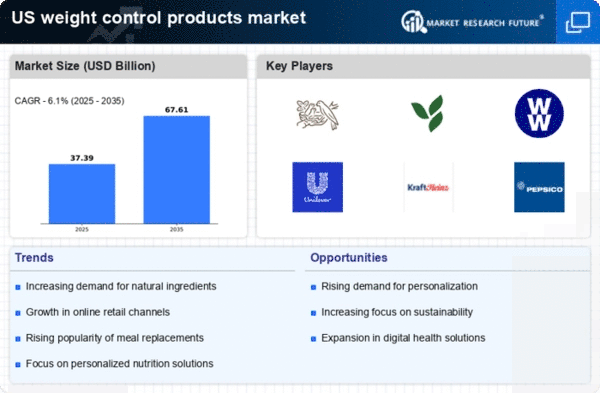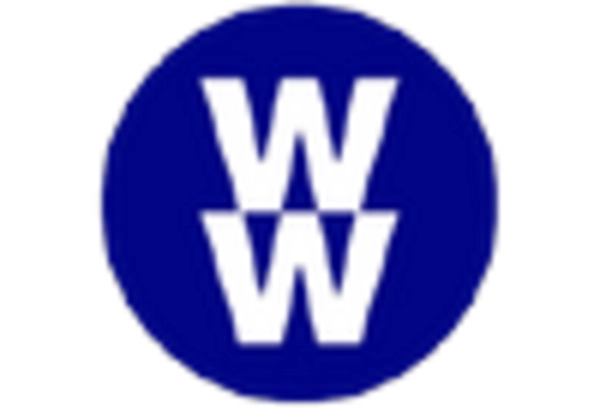Rising Obesity Rates
The the market is significantly influenced by the alarming rise in obesity rates across the US. Data from the Centers for Disease Control and Prevention (CDC) indicates that over 42% of adults were classified as obese in 2020, a trend that continues to escalate. This public health crisis has prompted a greater demand for effective weight management solutions, as individuals seek to combat obesity-related health issues. The weight control-products market is likely to expand as consumers turn to various products, including supplements, meal replacements, and dietary aids, to address their weight concerns. This driver underscores the urgent need for effective interventions in the face of rising obesity.
Influence of Social Media
The weight control-products market is significantly impacted by the influence of social media platforms, which play a crucial role in shaping consumer perceptions and behaviors. With millions of users sharing their weight loss journeys and success stories, social media serves as a powerful marketing tool for weight control products. Influencers and health advocates often promote specific products, creating a sense of community and accountability among followers. This trend appears to drive consumer interest and engagement, leading to increased sales in the weight control-products market. As social media continues to evolve, its impact on consumer choices in the weight control-products market is likely to grow.
Focus on Preventive Health
The weight control-products market is benefiting from a growing focus on preventive health measures among consumers. As healthcare costs rise and the emphasis on wellness increases, individuals are seeking proactive solutions to manage their weight and overall health. This trend is reflected in the increasing popularity of weight management programs and products that promote long-term health benefits. Market Research Future suggests that consumers are willing to invest in weight control products that not only aid in weight loss but also contribute to overall well-being. This shift towards preventive health is expected to drive sustained growth in the weight control-products market as more individuals prioritize their health.
Increasing Health Awareness
The weight control-products market is experiencing a notable surge in demand driven by heightened health awareness among consumers. As individuals become more conscious of their dietary choices and lifestyle habits, the inclination towards weight management solutions intensifies. Recent surveys indicate that approximately 70% of adults in the US actively seek to maintain or lose weight, reflecting a significant shift in consumer behavior. This growing awareness is further fueled by the proliferation of health-related information through digital platforms, encouraging individuals to adopt healthier lifestyles. Consequently, the weight control-products market is poised for growth as consumers increasingly prioritize products that align with their health goals.
Innovative Product Development
The weight control-products market is witnessing a wave of innovative product development, which is reshaping consumer choices. Companies are increasingly investing in research and development to create novel formulations that cater to diverse dietary preferences and health needs. For instance, the introduction of plant-based meal replacements and low-calorie snacks has gained traction among health-conscious consumers. This trend is supported by market data indicating that the plant-based food sector is projected to reach $74 billion by 2027. As innovation continues to drive the market, consumers are likely to gravitate towards products that offer both efficacy and convenience, further propelling the weight control-products market.
















